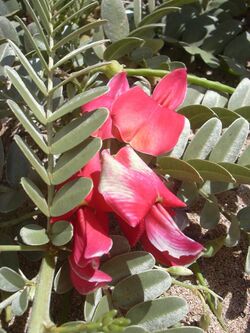Biology:Sesbania tomentosa
| Sesbania tomentosa | |
|---|---|

| |
| Scientific classification | |
| Kingdom: | Plantae |
| Clade: | Tracheophytes |
| Clade: | Angiosperms |
| Clade: | Eudicots |
| Clade: | Rosids |
| Order: | Fabales |
| Family: | Fabaceae |
| Subfamily: | Faboideae |
| Genus: | Sesbania |
| Species: | S. tomentosa
|
| Binomial name | |
| Sesbania tomentosa Hook. & Arn.
| |
| Synonyms | |
|
Agati tomentosa (Hook. & Arn.) Nutt. ex A.Gray[2] | |
Sesbania tomentosa, commonly known as Oahu riverhemp[3] and ʻōhai, is an endangered species of plant in the pea family, Fabaceae, that is endemic to the main Hawaiian Islands as well as Nihoa and Necker Island. It inhabits low shrublands and, rarely, dry forests,[4] at elevations from sea level to 2,500 ft (760 m).[5] Associated native plant species include akiʻaki (Sporobolus virginicus), ilima (Sida fallax), naupaka kahakai (Scaevola taccada), and pili (Heteropogon contortus).[1] Off-road vehicles, wildfires, grazing, and alien species competition have destroyed their habitat on the main islands, but they are still quite common on Nihoa and Necker. At least 2000 specimens grow on Nihoa, while there are far less on Necker.
ʻŌhai is highly polymorphic, exhibiting broad variations in color and shape. Plants that grow on Nihoa have reddish-orange flowers and young leaflets that are relatively hairless. Necker plants have salmon to orange colored-flowers, and leaflets that are very hairy. A form that grows as a standing tree exists on Molokaʻi. ʻŌhai grows as a prostrate shrub with semi-glaucous hairless leaves on the southernmost tip of the island of Hawaiʻi, Ka Lae.
References
- ↑ 1.0 1.1 "Sesbania tomentosa". CPC National Collection Plant Profile. Center for Plant Conservation. http://www.centerforplantconservation.org/ASP/CPC_ViewProfile.asp?CPCNum=3946.
- ↑ {{citation | mode = cs1 | title = Sesbania tomentosa | work = Germplasm Resources Information Network (GRIN) | url = | publisher = [[Organization:Agricultural Research ServAgricultural Research Service (ARS), United States Department of Agriculture (USDA) | access-date = 2011-03-01 }}
- ↑ "Sesbania tomentosa". Natural Resources Conservation Service PLANTS Database. USDA. https://plants.usda.gov/core/profile?symbol=SETO3.
- ↑ "ʻOhai". State of Hawaiʻi. http://www.state.hi.us/dlnr/dofaw/cwcs/files/Flora%20fact%20sheets/Ses_tom%20plant%20NTBG_W.pdf.
- ↑ "ohai, ohai". Hawaiian Ethnobotany Online Database. Bernice P. Bishop Museum. http://www2.bishopmuseum.org/ethnobotanydb/resultsdetailed.asp?search=ohai.
- Evenhuis, Neal L., ed (2004). Natural History of Nihoa and Necker Islands. Bishop Museum Bulletin in Cultural and Environmental Studies; No. 1. Honolulu, Hawaii: Bishop Museum Press. ISBN 1-58178-029-X.
External links
- "Sesbania tomentosa". Hawaiian Native Plant Propagation Database. University of Hawaiʻi at Mānoa. http://www2.hawaii.edu/~eherring/hawnprop/ses-tome.htm.
- Barboza, Rick (2005-09-03). "ʻOhai leaf tips give off sweet scent". Honolulu Star-Bulletin 10 (273). http://archives.starbulletin.com/2005/09/30/features/garden.html.
Wikidata ☰ Q1887651 entry
 |


